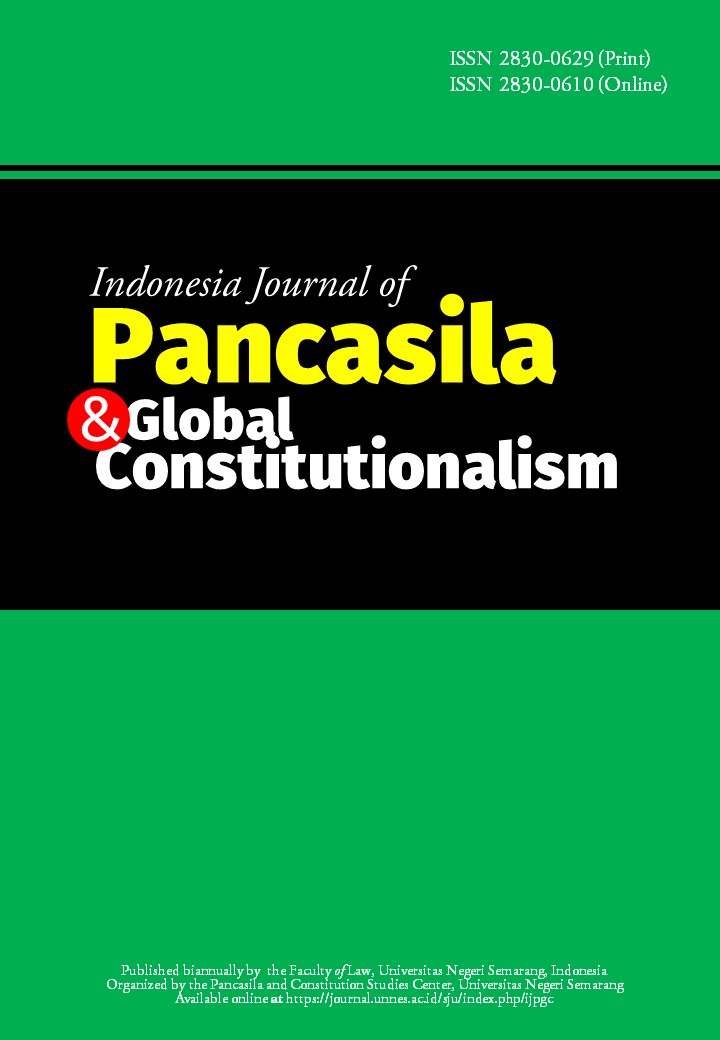The Challenge of Pancasila in Fair Law Enforcement
Main Article Content
Abstract
Pancasila has become a nation of Indonesia as the basis of the agreement of the Republic of Indonesia. Pancasila as the outlook of the nation need to be implemented in everyday life, this has been exemplified by the founders of the nation through hard work and struggle that resulted in the independence of Indonesia. Growing concerns the legal conditions that favor so much of the element of justice makes the thought keen to discuss whether the values taught by the pancasila is still disregarded or ignored. Pancasila which is the ideology of the nation as a way of life and the foundation in the activities of society, nation and state were impressed only used rote without application was included in the legal field. The quality of a country that became the benchmark guarding against the ideology of the nation's highly anticipated to control the implementation of the law with justice is based on the noble values of pancasila. All legislation must be an elaboration of the principles of pancasila. All laws and regulations that are inconsistent with pancasila, null and void. Therefore, in order to understand the accuracy of a legislation then it should be understood by studying the concepts, principles and values contained in pancasila.
Article Details

This work is licensed under a Creative Commons Attribution-ShareAlike 4.0 International License.
References
Danisworo. (2002). Pengertian Revitalisasi. Diakses dari http://makalahdanskripsi.go.id/2009.03/definifi-revitalisasi.html.
Dellyana, Shant. (1988). Konsep Penegakan Hukum. Yogyakarta: Liberty.
Djamali, Abdoel. R. (1993). Pengantar Hukum Indonesia. Jakarta: PT Raja Grafindo Persada.
Hadjon, Philipus M. (1987). Perlindungan Hukum Bagi Bangsa Indonesia.Surabaya: PT Bina Ilmu.
Hamidi, Jazim dan Mustafa Lutfi. (2010). Civic Education Antara Realitas Politik dan Implementasi Hukumnya. Jakarta: PT Gramedia Pustaka Utama.
Hasibuan, S. (2003). Mengubah Kekuatan Potensial Menjadi Kekuatan Riil. Jakarta: Majalah Perencanaan Pembangunan Bappenas Edisi 31.
Husni, M. (2006). Moral dan Keadilan Sebagai Landasan Penegakan Hukum. Surabaya: Equality.
Indonesia. Undang-Undang Dasar 1945.
Kansil dan Christin S.T Kansil. (2005). Modul Pancasila dan Kewarganegaraan. Jakarta: PT Pradnya Paramita, 2005.
Laboratorium Pancasila IKIP Malang. (1997). Refleksi Pancasila dalam Pembangunan. Surabaya: Usaha Nasional.
Lunis, Suhrawardi. (2000). Etika Profesi Hukum. Jakarta: Sinar Grafika.
Masyhur, Kahar. (1985). Membina Moral dan Akhlak. Jakarta: Kalam Mulia.
Mertokusumo, Sudikno. (1986). Mengenal Hukum. Yogyakarta: Liberty.
Moh Kusnardi dan Harmaily Ibrahim. (1988). Pengantar Hukum Tata Negara Indonesia. Jakarta: Pusat Studi Hukum Tata Negara FH UI.
Muladi dan Diah Sulistyani. (2013). Pertanggungjawaban Pidana Korporasi. Bandung: PT Alumni.
Notonagoro. (1987). Pancasila Sebagai Ilmiah Populer, cetakan ketujuh. Jakarta: Bina Aksara.
Prasetyo, Teguh. (2013). Hukum dan Sistem Hukum berdasarkan Pancasila. Yogyakarta: Media Perkasa.
Rahardjo, Sacipto. (2009). Pendidikan hukum sebagai pendidikan manusia. Yogyakarta: Genta Publishing.
Syahrani, Riduan. (2011). Rangkuman Intisari Ilmu Hukum. Bandung: PT Citra Aditya Bakti.
Taufiq, Abdullah. (2015). "Refleksi Atas Revitalisasi Nilai Pancasila Sebagai Ideologi dalam Mengeliminasi Kejahatan Korupsi ", UNIVERSUM 9 No 1.
Tobroni, dkk. (2007). Pendidikan Kewarganegaraan Demokrasi, HAM, Civil Society dan multikulturalisme. Malang: Pusapom.
Utrecht. (1957). Pengantar dalam Hukum Indonesia. Jakarta: PT Ikhtiar Baru.
Wiyono, Soko. (2011). Reaktualisasi Pancasila dalam Kehidupan Berbangsa dan Bernegara. Malang: Universitas Wisnuwardhana Malang Press.
